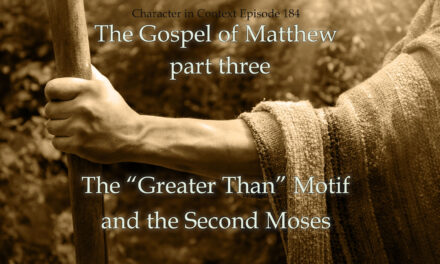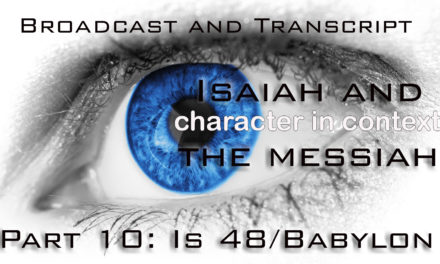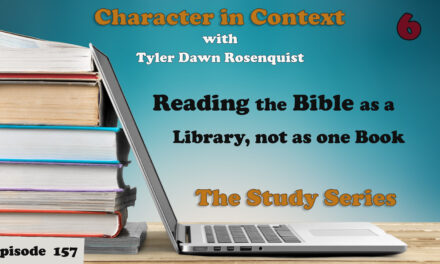When I wrote The Bridge: Crossing Over into the Fulness of Covenant Life, it was for the purpose of bringing people together who didn’t understand one another. On one hand, we had the burgeoning “Torah movement” of Christians who were discovering the delights of the Sabbath and Festivals, and the benefits of eating cleaner and on the other hand we had their families who were taught that this was legalistic. And no one was really behaving themselves or really listening and so people got needlessly angry and when people are angry, they are very likely to believe the worst about one another. And so they did–and we all forgot that we were saved at the Cross and not when we came to a certain level of knowledge. I gave a talk like this a couple of months back to an online group and I am recreating it from my notes today. My notes will be in the transcript at www.theancientbridge.com but it will not be the usual full transcript.
If you can’t see the podcast link, click here.
So, this is a bit different–no full transcript, I went from these notes and added a lot more so you might want to catch the actual podcast this time around.
I want to mostly talk about the problems with a lot of the teachings and propaganda and mantras and paradigms within the HRM and MJ that I see causing problems
- One of the most important things is that people largely don’t read the Bible correctly—we look at what was happening in the Biblical accounts and see things as ideals instead of descriptions. But the Bible, and I was reading Sandra Richter’s The Epic of Eden the other day and she made the point that I absolutely agree with—the Bible isn’t endorsing or canonizing Hebrew or Jewish culture or any other culture. The Bible is critiquing all human culture and shows how God is leading us out of our own worldly kingdoms into His Kingdom. Biblical heroes are also often monsters. They do terrible things. We were never meant to make excuses for them—when we see bad behavior the Bible, being a wisdom text, is inviting and even demanding that we engage viscerally with the story. We aren’t supposed to read it and be unmoved. Sometimes we will be thrilled and at other times we will be utterly disgusted. We will have questions about things that outrage us with no answers given. According to Yeshua, Moses even gave laws that were basically allowances for evil—slavery, and patriarchy, and alternatives to wartime rape. And it’s okay to react to that and even grapple with it as Jacob grappled with the angel of the Lord. If we aren’t struggling with the text then we aren’t really reading it as it was written to its ancient Near Eastern audience. When people coming to Torah aren’t taught that–that Torah is wisdom literature designed to promote critical righteous thinking and to serve as really a training manual for Israel’s judges, it gets misused as a very black and white list of do’s and don’ts with no discernment allowed for when to make exceptions, when to place one instruction before another, when one even invalidates another. Obviously now we see that chattel slavery, which Moses allowed, goes specifically against the commandments to love neighbor and foreigner both. We keep pushing the envelope of love, and we look back with gratitude that the world has come so far from the brutality of the ancient Near Eastern world of Abraham, Moses, and David that a lot of these laws were very avant-garde when they were given in terms of protecting women and children and foreigners and the vulnerable, now horrify us because the Cross has changed how we view everything.
- Everyone who has given their allegiance to Yahweh through His Son, no matter what name they call Him by, is our brother and sister. Period. Salvation is about allegiance, not about how much Torah we think is still in play.
- If you wouldn’t be willing to die on a cross for someone, don’t be too keen to overturn their tables. Or engage in polemic with them—ie name-calling—because it meant something in those times that it doesn’t mean now. And overturning tables was a prophetic act that only applied to the Messiah, just FYI. When we do it, it’s usually just bad behavior.
- Don’t forget your salvation—it’s easy when gaining knowledge (and not yet knowing how to figure out if it is true or not because Torah peeps dish out just as much nonsense as mainstream Christians, if not more) to forget what we know. And what we know is the very real experience of the New Creation, the very real changes in our lives, after we made that decision for Jesus. Although a lot of people scream and shout about not being saved by Torah, their words and actions are the opposite.
- No one keeps Torah, some people just keep a few more commandments than other people. And Christians aren’t lawless, they keep more than half (58%) of what can currently be observed (42%). Your average “TO” keeps maybe 8% more. And, sadly, the mainstream Christians who are keeping that 58% are more likely to be keeping the weightier matters of the law than TO peeps. These are mantras—TO and lawless, which don’t apply to anyone. I have found that once people are aware of it, the gulf between us really radically decreases. The Hebrew Scriptures have multiple words for sin—and different levels. The lowest is chattat, meaning an oopsie. You had no idea you were sinning and it wasn’t on purpose, you aren’t in rebellion. The worst is pesha, high-handed rebellion, spit in God’s face while you are purposefully doing something He really hates, like oppressing people. I’ll talk about this more later but God really does differentiate through the Torah, Prophets, and Writings. All sins are not created equal.
- Don’t get prideful about the easy stuff, like resting on the Sabbath and throwing the right parties, and eating cleaner. That’s why those aren’t included in the Matthew 25 separation of the Sheep and the Goats but caring for the vulnerable is the only criteria mentioned.
- It is important to keep in mind what an image-bearer is and is not. An image-bearer is quite literally a representative of God’s character on earth—the language used actually makes us out to be the equivalent of ANE idols, tselem, which were supposed to be indwelt by the spirit of the deity it represented. The people saw the idol and they were supposed to remember that god or goddess. It’s the things we do in public that show people God’s character, right rulings, justice, righteousness, and generosity. Speaking of fruit—we have to be careful about zeal. Because holy and unholy zeal are juxtaposed in Galatians 5. When we make the grave mistake (and I think almost everyone does it) of neglecting the NT and focusing on the Torah, we can become dreadfully unbalanced and even violent in our speech, actions, and in our faces. And people can’t see the love we are to have for one another because it has been replaced by anger, and anger can grow the wrong kind of zeal. Now the works of the flesh are obvious: sexual immorality, moral impurity, promiscuity, idolatry, sorcery, hatreds, strife, jealousy, outbursts of anger, selfish ambitions, dissensions, factions, envy, drunkenness, carousing, and anything similar. I am warning you about these things—as I warned you before—that those who practice such things will not inherit the kingdom of God. But the fruit of the Spirit is love, joy, peace, patience, kindness, goodness, faithfulness, gentleness, and self-control. The law is not against such things. Now those who belong to Christ Jesus have crucified the flesh with its passions and desires. If we live by the Spirit, let us also keep in step with the Spirit. Let us not become conceited, provoking one another, envying one another.
- The three-year tree requirement (lesson from the fruit tree). Learn, study, and keep your mouth shut. People who have recently made major shifts lack the understanding to rightly divide the new information they are getting. Being a Berean cannot be accomplished by listening to YouTube videos and just taking people’s word for things—if the Bereans had just taken Paul’s word for everything, they wouldn’t have bothered studying.
- Anger at the church compromises our discernment and judgment. They aren’t wrong about everything and, in fact, they are right about most things. You know, we are blinded to what we are blinded about. God opens eyes. Folks get ridiculously frustrated just because they preach and people don’t believe them. It doesn’t work that way. One, we have to have credibility with the people we are talking to (or they will be stupid to just take our word for everything) and also, they have to be receptive when we do it, plus, we can’t be behaving like unloving jerks. Speaking the truth in love—it isn’t done with a club or a machete. Pro 28:9 Anyone who turns his ear away from hearing the law—even his prayer is detestable.–>this one gets abused a lot. Hardly anyone would turn their ear from hearing Torah—the only question is how much has a person been conditioned to believe is still in play. This isn’t about rebellion, it’s about blindness and goodness knows we are all blind.
- Hebrew is not a unique language—it is very similar to many other languages of that region in antiquity. The idea of “returning to a pure tongue” is Rabbinic and much later than Biblical times. Also, Paleo-Hebrew isn’t a secret language, it’s a font like Times New Roman. This whole idea about the pictographs having meaning was created within the last hundred years because it took archaeologists a while to even figure out that it was Hebrew after they first found it in 1870 and at first they believed it was Phoenician. But the pictures were typical of the early origins of language and represented sounds and not concepts. This means that there are no ancient documents describing any such language, as the font went out of use in the 5th century BCE when the Aramaic language came to be used.
- Calendars and Names. I think there are five or six “Biblical calendars” out there. I know a guy who has actually preached all of them and has condemned as damned and stupid those on any other calendar than the one he is on right now. First, he was on Rabbinic, and then first-sliver, this is about ten years ago and he beat people to death with it. Then some folks preached dark moon conjunction to him and he was all over that and yelling at people. Then lunar Sabbath. Then the Jubilees calendar and now he is teaching Enoch calendar—and he isn’t the slightest bit humbled by how many times he has been “wrong.” He always thinks “Now I have got it!” And he is far from alone. Same thing with Names. I don’t even know how many names our floating along out there. And then there are people who will tell you that if you don’t say the Name exactly right, your prayers won’t be heard—but that’s right out of ancient magic beliefs, the idea that if you say the Name, just so, that you can control the god or goddess or demon and they have to hear and obey you. I have even heard it taught that if you are using Jesus that any miracles you receive are from the devil and not from God!
- A lot of what is taught by the HRM and MJ is simply not true but is passionately held to as though it is Scripture and I have taught some of it myself. Hislop, genetic hierarchies, etc. patriarchy, Hebraic vs Greek vs ANE. C&E. Marriages in crisis because not honoring vows to love them when they haven’t changed. And so we get all these memes filled with urban legends, lies, and outright propaganda from nonsense books and teachings that get aimed at Christians over Christmas and Easter that aren’t founded in one iota of archaeological evidence. But people made a lot of money writing books that weren’t researched or documented or footnoted, and sometimes when there are footnotes, they just refer to other books with no footnotes. There’s a reason why the people who really seriously study don’t teach this sort of thing. And why so many ministries have quietly removed these teachings from their repertoire.
- Pagan vs cultural. This is a biggie. There is a huge difference between something being idolatrous—which is actually bowing down to and serving another god, on purpose, and giving that god credit for the works of Yahweh—and something being simply cultural. Perfumed oil was placed on the head and feet of idols. It was also done to Yeshua—does that endorse paganism. The Egyptian tree of life was the acacia—does this mean that the paneling in the Holy of Holies and the Ark of the Covenant was pagan? For that matter, the Egyptians also had a portable shrine that looked a lot like the Ark. The ancient world also served their gods with sacrifices, unleavened bread, and hymn singing. Why were they also done for Yahweh? Because they are cultural ways of honoring the divine. It’s what you do with them that decides whether or not they are idolatrous.
- Fake names—hurting and angering the Jewish community by pretending to be Jewish and behaving badly online and putting them in danger of being hated even more. There is nothing to be gained in denying who we were when we came to faith and putting on what amounts to airs. And it is a real point of contention with other Christians, who see it as ridiculous and cultish. Our identity is in Christ—if Apollos and Junia, of all people, didn’t change their names when they were named after a false god and goddess respectively, then why do we feel like we need to do it? We can have no greater identity than we have in Messiah. Took me a lot of years to learn that I wasn’t a second-class citizen and I even wrote a book about it, King, Kingdom Citizen.
- Don’t call people unclean as an insult—we all have corpse impurity. And all it meant was that you couldn’t go within a certain distance of the Temple or a city. And unclean animals are only unclean as corpses and for food. We can ride them, have them as pets, and we can have pigs on the farm to deal with the trash and all that. Everything is clean for something or another. Clean just means in its proper place or proper state.
- Bad scholarship. If you can’t ask questions then don’t listen to someone. If they won’t give you their sources then what they are telling you cannot be credited as truth. Just because something shocked you or gave you a warm feeling doesn’t make it correct—we’ve all been misled by our emotions and our body’s reactions to those emotions. It’s rarely the Holy Spirit endorsing something we hear.
- Genealogies and pointless arguments—Titus 3:9 But avoid foolish debates, genealogies, quarrels, and disputes about the law, because they are unprofitable and worthless. 10 Reject a divisive person after a first and second warning.
- Truth is that we need to be looking out for people more than we do. In congregations it is easier—we mustn’t dare be so afraid of confrontation that we are unwilling to have a pretty short leash on the people who are new. We need to remove this false idea that they are expected to produce ministerial fruit right away and that is very counter to how churches are traditionally run. You know, we love those new people because they are so excited and energetic, but they are also generally foolish. Not foolish meaning stupid but lacking wisdom and perspective. The OT definition of a fool is someone who doesn’t understand their place—and the place of a new student isn’t to go out trying to teach the world and that causes so many problems with people coming out of mainstream churches and into more of an awareness of Torah





















